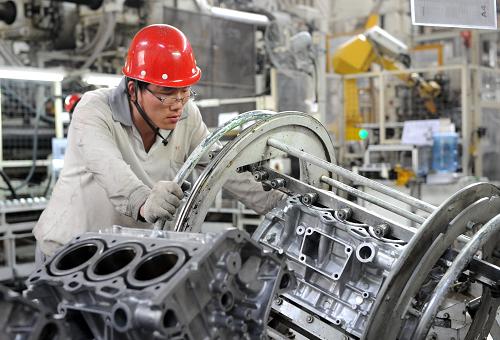

 |
| (Photo source: xinhua) |
Weak PMI data raises stimulus expectations
A private manufacturing survey released Monday showed the sharpest contraction in 12 months in April, boosting market expectations for new policy measures such as a cut in interest rates or banks' reserve requirement ratio (RRR).
The final reading of the HSBC/Markit Purchasing Managers' Index (PMI) for April came in at 48.9, the lowest level in a year and down from March's 49.6. A reading below 50 indicates contraction.
The deterioration marks a disappointing start to the second quarter. It was largely due to a drop in new business, which was caused by weak domestic demand, according to a statement from HSBC on Monday.
Employment in the manufacturing sector continued to decline and input and output prices both decreased at a stronger rate in April, even though exports picked up slightly, HSBC noted.
The weak PMI data came on the same day that the State Information Center - a government think tank affiliated with the National Development and Reform Commission - unveiled a forecast for weaker economic growth in the second quarter.
The center said that China's economy will grow by around 6.8 percent, slowing down from the first quarter's 7 percent growth and shy of the central government target of "about 7 percent" for 2015.
With economic data indicating weaker growth, additional easing policies might be in sight, according to economists.
"The PMI data indicates that more stimulus measures may be required to ensure the economy doesn't slow from the 7 percent growth rate seen in the first quarter," Annabel Fiddes, an economist at Markit, said in the statement.
Among the stimulus measures available to the government, new interest rate and RRR cuts are the most likely, Zhao Yang, China chief economist at Nomura Holdings, told the Global Times on Monday.
"The central bank has to cut interest rates in May to keep to the economic growth target," Xu Hongcai, an economist with the China Center for International Economic Exchanges, told the Global Times on Monday.
Both Zhao and Xu forecast there would be two more interest rate cuts and two more RRR cuts later this year.
The People's Bank of China (PBC), the central bank, unexpectedly cut interest rates by 25 basis points in November for the first time since July 2012 and by a further 25 basis points in February. The PBC has also lowered the RRR of major banks two times since November. Lowering the RRR can lead to more economic activity by allowing banks to increase lending.
The impact of the previous interest rate and RRR cuts might be seen in the second and third quarters as the effect of such policies usually takes two or three quarters to become evident, Zhao said.
"The HSBC data shows the current economic growth momentum is still weak but we also see some signs of stabilization of growth momentum compared with the first quarter," Zhao noted, citing the official PMI data.
China's official PMI released by the National Bureau of Statistics on Friday came in at 50.1 for April, unchanged from March.
The official PMI is weighted more toward larger firms and State-owned enterprises (SOEs), while the HSBC survey focuses more on smaller private firms.
"It is normal that bigger companies and SOEs recover faster than the small and medium-sized companies," said Xu, adding that the third and fourth quarters will probably see a growth rate of above 7 percent.
In addition to possible interest rate and RRR cuts, the government might speed up infrastructure investment via policy banks and could stimulate consumption by cutting taxes, Xu noted.
The recent weak economic data has spurred debate about whether China needs to launch its own quantitative easing (QE) program, a monetary policy tool that central banks deploy to boost the economy when standard monetary policies have become ineffective.
"QE would involve a sudden expansion of the central bank's balance sheet and strong efforts to bring down the benchmark interest rate to zero. This will not happen in China," Zhao said.
"The PBC's balance sheet has been expanding for almost two decades. Much more aggressive expansion is not likely," Zhao noted.
 J-11 fighters in air exercise
J-11 fighters in air exercise Beauties dancing on the rings
Beauties dancing on the rings Attendants-to-be join Mr. & Miss Campus Contest
Attendants-to-be join Mr. & Miss Campus Contest Beijing's toughest anti-smoking law takes effect
Beijing's toughest anti-smoking law takes effect Family lives in cave for about 50 years in SW China
Family lives in cave for about 50 years in SW China PLA soldiers operating vehicle-mounted guns in drill
PLA soldiers operating vehicle-mounted guns in drill Blind carpenter in E China's Jiangxi
Blind carpenter in E China's Jiangxi China hosts overseas disaster relief exercise for the first time
China hosts overseas disaster relief exercise for the first time 20 pairs of twins who will become flight attendants in Sichuan
20 pairs of twins who will become flight attendants in Sichuan Obama is sowing discontent in S.China Sea
Obama is sowing discontent in S.China Sea Rescuers work through night to reach cruise ship survivors
Rescuers work through night to reach cruise ship survivors Driving through limbo
Driving through limbo Facing down MERS
Facing down MERSDay|Week